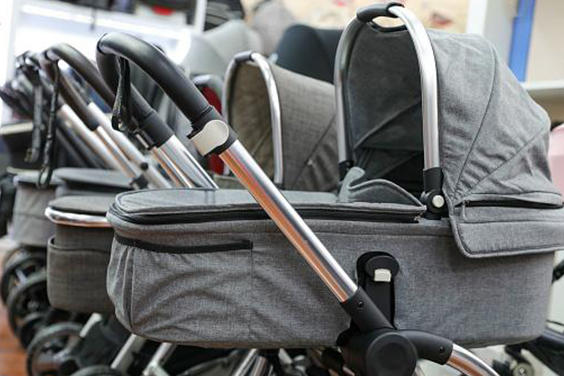When you, as a parent, strap your precious little one into a car seat, it’s more than just complying with the law – it’s about ensuring the safety of your most cherished one. Infant car seats have been intricately designed, passed through rigorous safety standards, and effectually reduce the risk of severe harm in the event of a crash or sudden stop. However, it’s crucial to understand one primary fact – car seats expire. Yes, you heard it right. But why do car seats expire, and how long are infant car seats good for?
Knowing the expiration date on car seats is pivotal because it directly impacts your child’s safety. Posing questions like “Do car seats expire?” and “When do car seats expire?” is an excellent starting point in understanding the longevity of a car seat.
Understanding Car Seat Expiration: The Basic Facts
To ensure the utmost safety for your child, you must understand the basic facts about car seat expiration. So, how long is a car seat good for, and why do car seats have expiration dates?
Firstly, let’s discuss the lifespan of a car seat – how long are car seats good for before they expire? Simply put, car seat expiration dates can vary from brand to brand. Generally, the lifespan of an average car seat ranges from 6 to 10 years, starting from the date of manufacture, not when it’s bought or first put to use. This range is also applicable for a specific brand like Graco – so for those wondering how long are Graco infant car seats good for, they fall within this same estimate.
Secondly, why do car seats expire? There’s a slew of reasons – one being the norm for automatic expiration dates in today’s scenario, which covers a multitude of items including car seats. This exists primarily because materials degrade over time, including the plastic making up most of the car seat. Moreover, safety standards and technologies continuously evolve, making older models inadequate over time. Therefore, the expiration date on car seats is an alert that it may not provide complete protection anymore.
Another practical aspect to consider is that parts get old, go missing or break. Imagine if a significant problem occurs and you need replacement parts or support only to realize that the manufacturer no longer makes or stocks them. So, the practicality of using expired car seats diminishes – boosting logic behind the question, “Do car seats have an expiration date?”
As you can see, the infant car seat expiration date is not just about age – it’s about safety and functionality falling in line with ongoing advancements in technology.
The Safety Behind Car Seat Expiration Dates
There’s in-depth safety reasoning behind car seat expiration dates, adding weight to our question: how long are infant car seats good for? You see, car seat manufacturers put these expiration dates to ensure top-notch safety standards. Over time, car seats can experience regular wear and tear, subjecting them to potentially unseen, damaging extreme temperatures.
Moreover, as time passes, safety regulations and requirements established by groups like the National Highway Traffic Safety Administration (NHTSA) and the American Academy of Pediatrics (AAP) evolve. The expiration date consolidates the fact that the seat meets all safety prerequisites at the manufacture date, but may not meet newer, refined safety standards later. So if you’re using old car seats, you could be unknowingly posing a risk to your little angel.
The vital clause here is – while your infant car seat may seem in good condition to the naked eye, there could be concealed damage or wear you’re unaware of. Considering booster seat expiration dates or determining how long an infant car seat is good for isn’t a marketing ploy by manufacturers, but a significant safety issue.
Manufacturing Concerns: How Long Are Infant Car Seats Good For?
When it comes to the manufacturing aspect, the lifespan of different seats varies, and each brand will provide its unique expiration date – this includes widely recognized brands such as Graco and Chicco. You may wonder, how long are Graco infant car seats good for, particularly? Like most infant car seats, the Graco seats are typically good for seven to ten years from the date of manufacture. Similarly for the question, how long are Chicco car seats good for – they usually recommend using their seats for up to eight years.
One other critical point to note is the car seat expiration date vs. the date of manufacture. Car seats expire based on their date of manufacture, not the purchase or initial use date. The expiration date considers the wear and tear it might undergo during its lifetime, including storage, which is why the manufacture date, and not the purchase date, is crucial.
Remember, it is always important to check the owner’s manual for specifics about the seat lifespan.
Material Breakdown: Why Do Infant Car Seats Expire?
The typical car seat comprises materials like plastic, metal, and fabric: all of which experience some form of degradation over time. Plastics, a major component, are prone to aging. Extreme temperatures inside cars can hasten the process, making the plastic brittle over time, compromising the structural integrity of the car seat—thereby explaining why car seats expire.
The consistent tightening and loosening of straps, not to mention spills, crumbs and other ‘baby byproducts’, contribute to wear and tear which could compromise safety. The harness, padding, and plastic pieces used in car seats might not look different to the naked eye, but the degradation of these components can pose hazards in the event of a crash.
How does weather impact the lifespan of an infant car seat?
A car seat’s location during its life span can significantly affect its degradation. Frequent exposure to sunlight, humidity, and extreme heat or cold can quicken the breakdown of materials—especially plastic.
This is why it’s crucial to avoid leaving car seats in extreme temperatures for extended periods. Intense cold can make plastic brittle while extreme heat can weaken it, decreasing its ability to withstand force during a severe crash or accident.
So, when considering how long are infant car seats good for, you need to factor in where and how that car seat has been stored and used.
The Dangers of Using Expired Car Seats
Using expired car seats is a risk not worth taking. As time passes and materials break down, the car seat might not perform as designed in a crash. Remember, these seats undergo rigorous crash testing based on safety standards of their manufacture date. As these standards evolve, older models might not keep up owing to outdated technology or worn-out components.
The risks go beyond material degradation. Older seats might lack modern safety features found in more recent models. Also, if parts are missing and the model is no longer in production, finding replacements becomes tricky. Thus, an expired car seat might compromise your child’s safety, even if it looks in good condition.
Detecting an Expired Car Seat: Signs to Look For
To the untrained eye, an expired car seat might appear in perfectly good shape, but hidden signs might tell a different story. If you’re planning to use a secondhand seat, keep an eye out for:
- Brittle or faded plastic: Frequently exposed to harsh sunlight, car seats may suffer internal damage, weakening over time and making them less likely to handle stress during a crash.
- Frayed or worn-out harness: Harnesses ensure children are securely fastened in their seats. Over time, these can become frayed and less effective.
- Missing parts: Make sure no crucial components are absent. If replacement parts are needed but the car seat model has been discontinued, you might be unable to procure required parts.
For existing car seat owners or those considering used car seats, some tell-tale signs show a car seat might have reached its expiration date and isn’t as safe as a newer model.
How to Determine Your Infant Car Seat’s Expiration Date
So, how do you figure out ‘how long do car seats last’ or a ‘car seat’s expiration date?’ The expiration date for car seats is often imprinted somewhere on the seat or found in the instruction manual. It’s usually on the bottom or side of the car seat, and might be engraved into the plastic, not just printed on a sticker. Make sure to look for terms like ‘Do Not Use After’ followed by a date. It might also be stated in a label format, mentioning the manufacture date and the lifespan of the seat.
For accurate information regarding ‘when do car seats expire,’ take the manufacture date and add the seat’s lifespan as provided by the manufacturer. Here’s an example: if the manufacture date is January 1, 2015, and the car seat lifespan according to its manual is ten years, then the expiration date will be January 1, 2025.
Regulations and Laws Regarding Infant Car Seats Expiration
Let’s move on to the laws and regulations about car seat expiration. The National Highway Traffic Safety Administration (NHTSA) advocates that car seats be replaced after their expiration date. The American Academy of Pediatrics (AAP) also supports this.
While not legally enforced, expiration dates are set by car seat manufacturers to ensure safety and should be adhered to. In some places, like California, it’s illegal to sell car seats that do not meet current safety standards, which may include expired car seats.
To stay informed about the latest safety standards, check out sources like the NHTSA, AAP, and even manufacturer’s websites. They offer up-to-date information about child passenger safety.
What should I look for when buying a secondhand infant car seat?
If you consider buying a secondhand infant car seat, certain elements should draw your attention:
- Be cautious of car seats from thrift stores or garage sales. They may look great, but be lacking in safety standards or have expired.
- Check the car seat for a visible expiration date and compare it to the current date.
- Make sure the car seat has not been involved in a moderate to severe crash.
- Inspect the car seat thoroughly for any visible damage, missing parts, or signs of wear and tear on the harness and plastic parts.
- Ensure the car seat comes with the original instruction manual, which you would need for correct installation and usage.
- Research to ensure the car seat model hasn’t been recalled. The NHTSA keeps an up-to-date list for reference.
Tips for Lengthening Your Infant Car Seat’s Lifespan
While you can’t change the fundamental factors leading to car seat expiration, here are some tips to potentially extend your car seat’s lifespan while maintaining safety:
| Tips to Extend Car Seat Lifespan | Description |
| Store wisely | If you’re storing a car seat for future use, keep it in a cool, dry location away from direct sunlight or extreme temperatures. |
| Gentle cleaning | Follow the manufacturer’s recommendations on cleaning. Harsh chemicals can break down plastic and compromise the structure. |
| Harness handling | Make sure not to stress the harness unnecessarily, which can lead to fraying or breaking over time. |
| Avoid heavy items | Don’t place heavy objects on the car seat which could damage it, especially during transportation. |
How can I properly dispose of an expired infant car seat?
What to do with those expired car seats? Proper disposal is essential. Before disposal, consider the following steps:
- Cut the harness to ensure the car seat can’t be used again.
- Write “expired” or “do not use” with a permanent marker on the car seat shell.
- Remove any detachable parts and dispose of them separately.
You can dispose of car seats at recycling centers where they are broken down and used for other products. Some retailers also have trade-in programs where you can bring your expired seats for safe disposal.
Remember, safety should always come first. An expired car seat might seem like a bargain or a handy hand-me-down, but it’s not worth the potential risk to your child’s life.
Conclusion: Ensuring Safety with Updated Infant Car Seats
Ensuring the safety of your child while traveling is a top priority, and understanding car seat expiration plays an integral part in that process. Providing the answer to the question “How long are infant car seats good for?” is the understanding that a car seat will degrade over time due to regular wear and tear, material breakdown, and exposure to extreme temperatures.
While car seats like River Baby, Graco, Maxi-Cosi, safety 1st, etc are good for around seven to ten years, it’s important to remember that each brand has its own specified lifespan. Reading the instruction manual for the expiration date, understanding how to detect wear and tear, following regulations, and considering these points while purchasing a secondhand seat form the foundation of your child’s safety.
As a reputable brand, River Baby provides high-quality car seats and boasts a wide range of baby products like strollers, high chairs, baby playpens, etc. Our safe and comfortable products truly cater to your baby’s needs and can significantly contribute to your peace of mind.
In conclusion, paying heed to your car seat’s expiration isn’t just a precaution; it’s a necessity. Using a seat past its expiry can potentially compromise your child’s safety. Always remember to use updated infant car seats that comply with the current safety standards, and when the time comes, dispose of your expired seat responsibly. The safety and well-being of your little ones are undoubtedly worth these measures, and brands like River Baby are there to aid in this journey of parenthood.
Remember, your journey through parenthood will include numerous car rides. Make each one of those journeys safe for the ones you cherish the most. Thanks for staying with me till the end of this comprehensive guide. Remember to always prioritize your child’s safety with companies like River Baby supporting you each step of the way.






